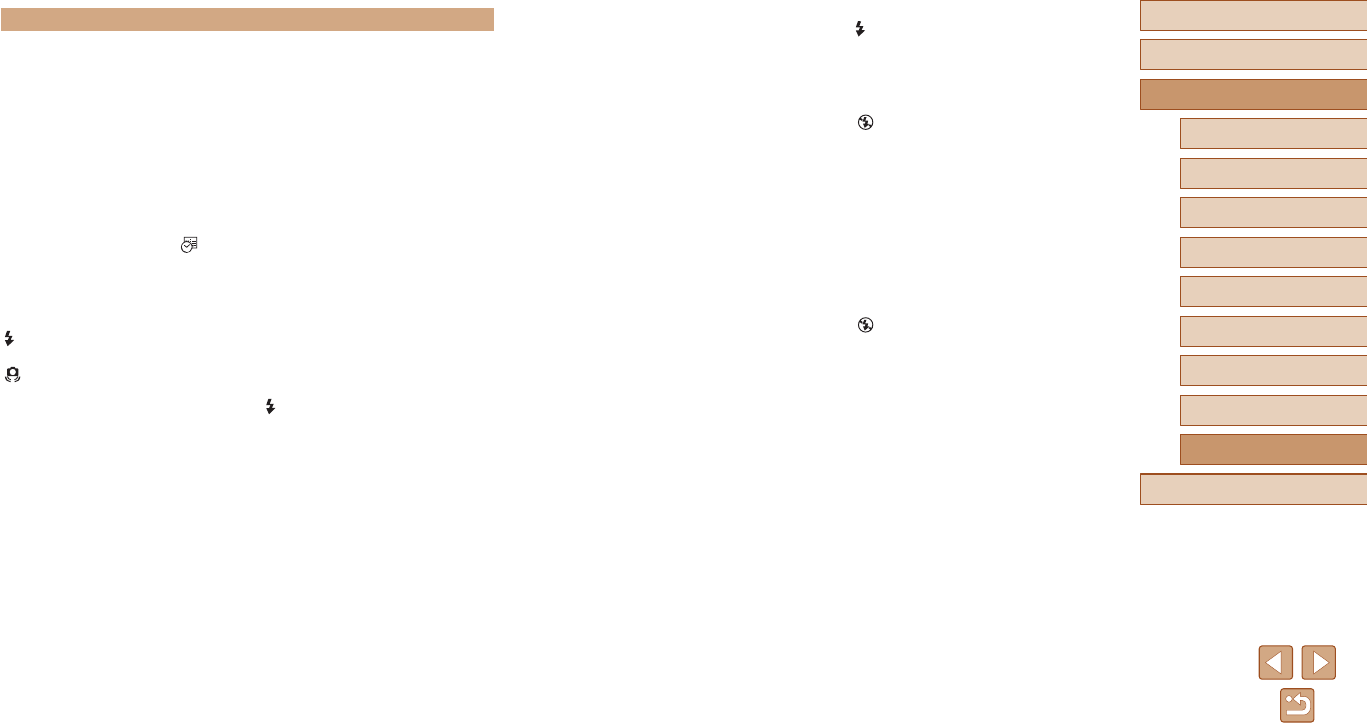
120
Before Use
Basic Guide
Advanced Guide
1
Camera Basics
2
Auto Mode /
Hybrid Auto Mode
3
Other Shooting Modes
4
P Mode
6
Playback Mode
5
Tv, Av, and M Mode
7
Setting Menu
8
Accessories
9
Appendix
Index
Subjects in shots look too dark.
● Raise the ash and set the ash mode to [ ] (
=
68).
● Adjust brightness by using exposure compensation (
=
59).
● Adjust contrast by using i-Contrast (
=
60,
=
90).
● Use AE lock or spot metering (
=
59,
=
59).
Subjects look too bright, highlights are washed-out.
● Lower the ash and set the ash mode to [ ] (
=
29).
● Adjust brightness by using exposure compensation (
=
59).
● Use AE lock or spot metering (
=
59,
=
59).
● Reduce the lighting on subjects.
Shots look too dark despite the ash ring (
=
32).
● Shoot within ash range (
=
135).
● Adjust brightness by using ash exposure compensation or changing the ash
output level (
=
69,
=
73).
● Increase the ISO speed (
=
60).
Subjects in ash shots look too bright, highlights are washed-out.
● Shoot within ash range (
=
135).
● Lower the ash and set the ash mode to [
] (
=
29).
● Adjust brightness by using ash exposure compensation or changing the ash
output level (
=
69,
=
73).
White spots appear in ash shots.
● This is caused by light from the ash reecting off dust or airborne particles.
Shots look grainy.
● Lower the ISO speed (
=
60).
Subjects are affected by red-eye (
=
43).
● Set [Red-Eye Lamp] to [On] (
=
46) to activate the red-eye reduction lamp
(
=
4) in ash shots. Note that while the red-eye reduction lamp is on (for
about one second), it is not possible to shoot, because the lamp is counteracting
red-eye. For best results, have subjects look at the red-eye reduction lamp. Also
try increasing the lighting in indoor scenes and shooting at closer range.
● Edit images using red-eye correction (
=
91).
Recording to the memory card takes too long, or continuous shooting is
slower.
● Use the camera to perform low-level formatting of the memory card (
=
98).
Shooting settings or FUNC. menu settings are not available.
● Available setting items vary by shooting mode. Refer to “Functions Available in
Each Shooting Mode”, “FUNC. Menu”, and “Shooting Tab” (
=
125 –
=
128).
Shooting
Cannot shoot.
● In Playback mode (
=
74), press the shutter button halfway (
=
24).
Strange display on the screen under low light (
=
25).
Strange display on the screen when shooting.
● Note that the following display problems are not recorded in still images but are
recorded in movies.
- The screen may icker and horizontal banding may appear under uorescent
or LED lighting.
No date stamp is added to images.
● Congure the [Date Stamp ] setting (
=
18). Note that date stamps are not
added to images automatically, merely because you have congured the [Date/
Time] setting (
=
40).
● Date stamps are not added in shooting modes (
=
128) in which this setting
cannot be congured (
=
40).
[ ] ashes on the screen when the shutter button is pressed, and shooting
is not possible (
=
32).
[ ] is displayed when the shutter button is pressed halfway (
=
32).
● Set [IS Mode] to [Continuous] (
=
70).
● Raise the ash and set the ash mode to [
] (
=
68).
● Increase the ISO speed (
=
60).
● Mount the camera on a tripod or take other measures to keep it still. Additionally,
you should set [IS Mode] to [Off] when using a tripod or other means to secure
the camera (
=
70).
Shots are out of focus.
● Press the shutter button halfway to focus on subjects before pressing it all the
way down to shoot (
=
24).
● Make sure subjects are within focusing range (
=
136).
● Set [AF-assist Beam] to [On] (
=
45).
● Conrm that unneeded functions such as macro are deactivated.
● Try shooting with focus lock or AF lock (
=
67).
No AF frames are displayed and the camera does not focus when the
shutter button is pressed halfway.
● To have AF frames displayed and the camera focus correctly, try composing the
shot with higher-contrast subject areas centered before you press the shutter
button halfway. Otherwise, try pressing the shutter button halfway repeatedly.
